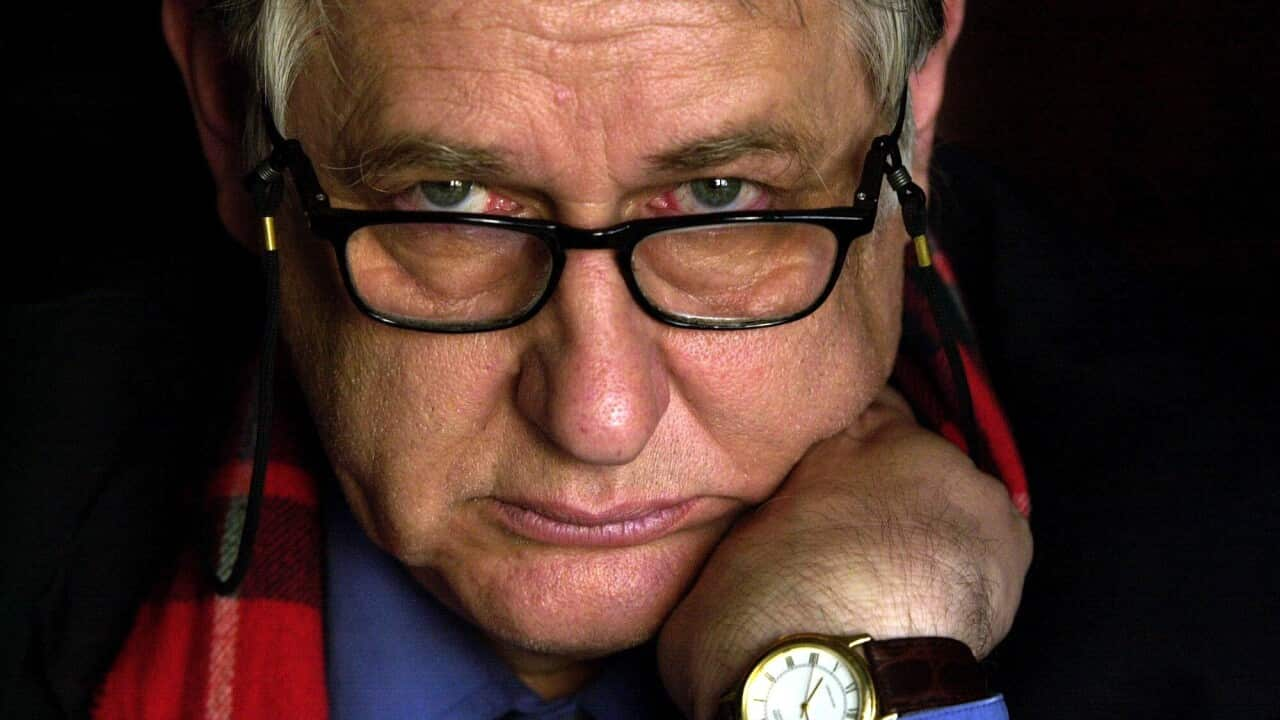Bob Ellis is gone, dead at 73, claimed by the cancer that had dogged him since last winter.
He went surrounded, as he wished, by his family.
I knew him a little. But that’s not much of a boast. Anyone over a certain age who has had anything to do with film in Australia in the last few decades can say the same and like me, would be grateful for whatever brief encounters they can recall.
Bob is being remembered as a scoundrel and walking scandal. It was, like the rumpled appearance, a performance he cultivated. Which is not to say he was not reckless or unhurtful.
But now he’s gone it has to be said, hatred was not native to him like so many who fell to the hammer blows of his prose.
Bob had a restless, feverish imagination and the work ethic of a monk on a mission.
He was playwright, filmmaker, actor, lyricist, prodigious essayist, speechwriter.
When I first heard of him I was still at school. He had written Newsfront (1978) by then and I learned later of its tortuous production history. Ellis, as he so often did, played the Holy Fool in that behind the scenes story. They ruined what he felt was a masterpiece, he told anyone who would listen.
Bob grew to loathe producers and the power they wielded. No one could do indignation like Bob. But it says a great deal about Bob that he learned to regret – in private and public – such tantrums. He won an AFI award for Newsfront of which he was justly proud.
Once I started writing professionally Bob was there again. This was in the '80s and Bob was giving lengthy interviews (no conversation with Bob was ever short.)
He was barracking for the preservation of Australian values in movies and television – under threat from the pernicious influence of American pop culture.
It seems an academic argument now, but at the time the stakes were high. It had to do with authenticity. Bob felt that the only way to make movies for the world was to not apologise for who you were or where you came from. The other side of the conversation was about dialling down Australian identity to the point where it was a whisper.
“Americans are not like us,” he insisted to me once in an interview. “Dolphins are like us too… but it would be a mistake to try and fuck one.”
Bob had a charming tendency to land an argument with a thundering one liner.
Words were his choice weapons, wielded with extraordinary skill, and welded by wit, and the cruel, sad wisdom of a man who felt that he had been invited to the party by mistake.
The truth was that Bob was not a hater, but a lover. He adored the theatre and at one time – with his wife Anne Brooksbank rescued one of Sydney’s best stages, when it looked like it was destined for oblivion.
Such generosity was not atypical.
In this world where everyone is connected, it remains an effort of some epic struggle to reach those who dwell in the show and business of show business.
Not so Bob and it never was. He always returned a phone call. It doesn’t sound like much. But when one is young, ignorant, eager to learn asking for a favour, a quote, advice or help it is everything. No one could be as good a friend to a young budding artist as Bob. I think it was because he had been hurt often in his own early years.
For a time I was working on a group biography of filmmakers who came of age in the '70s.
I interviewed Bob once more and as always he was garrulous, hilarious, and incapable of staying on point, which made him both great company and frustrating as hell.
I was asking him about the public feuds that were so much a part of his life: the terrible public brawls with David Williamson, John Pilger and Abbott (Tony) and Costello (Peter).
I suggested he might be asking for it, that he sought it out, needed it.
It was not a comfortable proposition and now he is gone I wished I never said it.
But Bob would have none of it. For him – the quarrels, the missteps - it was all part of his authentic self. He spoke of his loving marriage – a partnership he cherished, the decades long friendships – professional and private – with agents and artists.
It was a side of Bob I had never seen in public. He was proud, unaffected and dignified. He showed me mercy. He suggested he was and remained an Outsider – one never destined to be part of any elite.
He said he always would be the Adventist lad from the bush raised to believe that Armageddon would arrive to save the Faithful.
Liked so many lapsed Christians, Bob’s passion was transmuted into the arts and politics.
Bob always felt a masterpiece was in reach whether it was a movie or a book, but something always got in the way.
I think he felt burdened by the success of his peers from his Uni days: Germaine Greer, Clive James…
But Bob’s life was his masterpiece. He worked to the end and the work offers a unique voice in Australian letters.
Watch his movies. Seek out the best of them: not only Newsfront, but Goodbye Paradise (1981).
It’s a movie about getting older and knowing who you are and why you believe. Essential Ellis.
I am sad there will be no more calls.
Share
